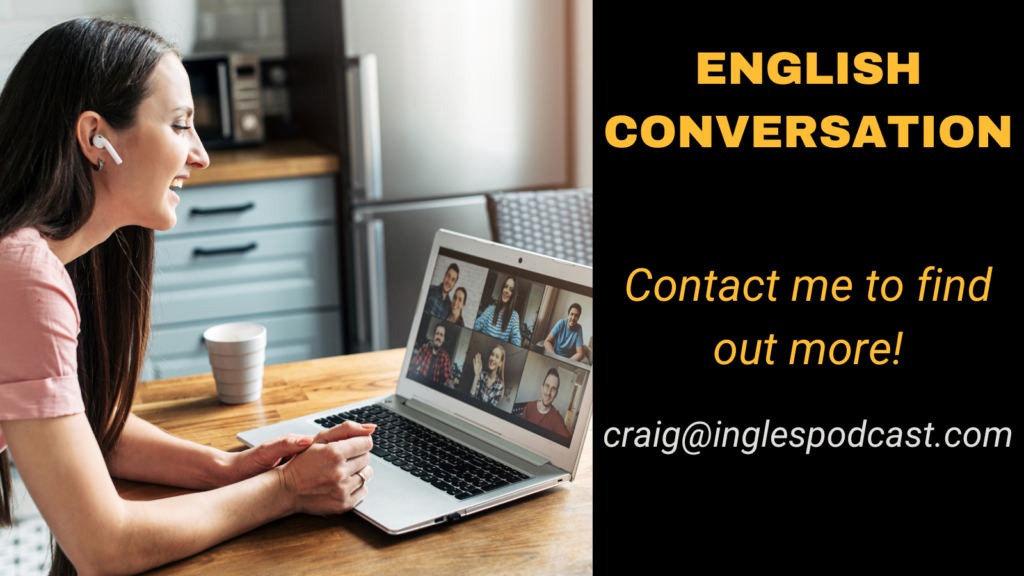
In today’s podcast, you’ll learn all about auxiliary verbs. What are they? Why do we use them? How do we use them? And we’ll also answer Reyna’s question about using auxiliary verbs for emphasis. So, DO please take a seat, relax and enjoy this grammar episode.
Voice message from Mayte from Seville
Advice on practice speaking and listening Xwhile I were thereX – when/while I’m there
Shopping – try to extend casual conversations by asking follow-up questions.
meetup.com (not only for language exchange but for local interest groups)
Pubs, events (live music, comedy clubs, theatre etc)
Audio message from Reyna from Mexico
Auxiliary verbs
Verbs in English don’t have many different forms. The maximum (except for the verb ‘be’) is five. For example: see; sees, seeing, saw, seen.
To express different meanings, we use auxiliary verbs which ‘help’ the main verbs.
There are two groups of auxiliary verbs: be, do, and have, and modal auxiliary verbs like will, should, must, may, could, etc.
We use these modal verbs to add meaning to main verbs. For example, the meaning of certainty/probability, ‘I might go to France on holiday’ or ‘Reza must be teaching, he’s not answering his phone.’
And for obligation/advice, ‘You should go to the doctor.’ ‘I must buy a new pair of slippers’.
We’ve spoken about modal verbs many times on previous podcasts. Search ‘modal verbs’ in the search box.

https://www.englishcraig.com/
BE/DO/HAVE
BE: we add ‘be’ to other verbs to make the passive and progressive/continuous forms.
“Is it raining?”
They were eating their dinner.
“He was (past of BE) imprisoned for stealing the money.”
It was raining during the concert.
It’s beautiful to love and to be loved.
DO: we use “do” to make questions, negatives and emphatic forms.
Do you like this podcast?
It doesn’t matter.
Do please sit down.
Did (past of DO) you visit Scotland last year?
They didn’t attend class yesterday.
Why didn’t you send me a photo on your mobile?
HAVE: we use “have” to make perfect forms.
What have you done today?
We’ve (=We have) tried that new Mexican restaurant.
I haven’t drunk alcohol for many years.
Has she done her homework yet?
He’s (=He has) just arrived.
I realised that I had (past of have) forgotten my wallet.
She’d (=She had) already visited France before the war.
I wish I hadn’t drunk so much last night.
Auxiliary verbs in short answers
Do you like apples? – Yes, I do.
Did your daughter come home very late last night? – (Yes,) I’m afraid she did.
Tell me you haven’t eaten the last biscuit, Craig? – Yes, I have. Sorry.
Does your back still hurt? – No, it doesn’t now.
Auxiliary verbs for emphasis
Yes, I do believe you’re right.
She does like you, I’m sure!
I do think you’re making a mistake.
You have grown! (when we emphasize auxiliary verbs the pronunciation changes)
You’ve grown a lot. Vs You have grown!
I’m telling the truth. Vs I am telling the truth! I promise.
Using the full “do not”, “am not” or “have not” instead of a contraction can also add emphasis, especially for a negative point:
“I do not agree with that statement.” (strong disagreement)
“I have not had sex with that woman.” (Bill Clinton during the Monica Lewinsky scandal)
Auxiliary verbs for contradiction/agreement
You didn’t send me the notes for today’s podcast.
Yes, I did.
I’ve never seen anything like this before.
I have / Neither have I
I hope it’s sunny tomorrow.
So do I. / Really? I don’t.
She doesn’t eat meat. I think she’s a vegetarian.
She does eat meat, but not very often.
You don’t like chocolate biscuits, do you? – Yes I do!
Auxiliary verbs in tag questions
You live here, don’t you?
Reza hasn’t arrived yet, has he?
Ronnie did a good job, didn’t he?
Craig isn’t still eating biscuits, is he?
…and now it’s your turn to practise your English. What grammar, vocabulary or pronunciation area would you like us to speak about next? Before you send us your suggestions, please do a quick search on our website just to check that we haven’t already spoken about it.
Send us a voice message. https://www.speakpipe.com/inglespodcast
Send us an email with a comment or question to [email protected] or [email protected]
If you’re a Spanish speaker and you want to study for free, visit the mansioningles website and for paid eBooks and audios for self-study check out the online store: https://store.mansioningles.net/
Thank you to our Patreon supporters. Join our Patreon program for as little as $1.50 per month and you get instant access to the transcriptions of this podcast. https://www.patreon.com/inglespodcast
Welcome to our new Patreon supporters who have joined us this month:
Charly
Orlando olivares
Francisco Armas
Milagros Seveso
Ignacio Gil Ruiz
In next week’s episode: Virtues and Vices
If you enjoyed this podcast, please tell your friends!
The music in this podcast is by Pitx. The track is called ‘See You Later’



